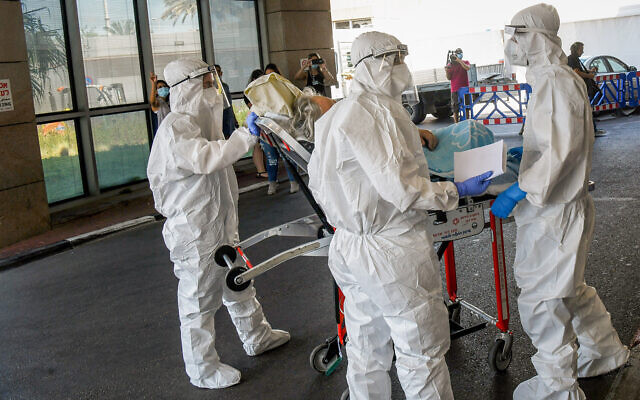113 patients in serious condition Wednesday night; 1,014 new cases in 24 hours; Beitar Illit residents protest against Netanyahu after city declared ‘restricted area’

The Health Ministry on Wednesday night delayed making a decision on locking down population centers with high rates of COVID-19 infections to curb the virus outbreak as new cases in Israel spiked.
After several hours of talks, ministry officials failed to finalize recommendations on declaring some cities and neighborhoods as “restricted areas” and put off a hearing with cabinet ministers until Thursday, according to Channel 12 and Army radio. Cabinet ministers are expected to make an announcement on lockdowns following Thursday’s meeting.
The restrictions could differ per city, ranging from the bolstering of enforcement to a complete lockdown, depending on the severity of the outbreak.
Earlier Wednesday, Prime Minister Benjamin Netanyahu ordered cabinet ministers to convene immediately to make a decision on restricted areas, his office said in a statement.
The Prime Minister’s Office did not specify which areas will be put on lockdown, but Channel 12 news reported that up to nine cities and towns, in whole or in part, could be closed off: Jerusalem, Bnei Brak, Ashdod, Modi’in Illit, Ramla, Beit Shemesh, Kiryat Malachi, Lod and Ra’anana.
Several of the cities’ mayors were reportedly outraged that they had not been contacted about the move, and that the Health Ministry had not released clear criteria for how it was making decisions on lockdowns.
The only area of the country currently under lockdown is the ultra-Orthodox city of Beitar Illit, which was declared a restricted zone on Tuesday for seven days as coronavirus infections there spiked. The lockdown of the settlement, located south of Jerusalem, went into effect at 1 p.m. on Wednesday.
Some residents of Beitar Illit who were infected were being transferred to a hotel in northern Israel on Wednesday night to curb the spread in the community.
Several dozen Beitar Illit residents, including children and business owners, protested the closure on Wednesday at the entrance to the city, Channel 12 reported. The protesters directed their fire at Netanyahu, saying the government was unfairly targeting ultra-Orthodox communities in its lockdowns. Almost all of the city’s 55,000 residents are ultra-Orthodox.

Officials said Tuesday that Beitar Illit had 240 active cases, representing a rate of increase in active cases in the past week of 224 percent.
The Health Ministry said Wednesday night that there were 1,014 new infections in Israel since midnight Tuesday, bringing the total number of cases since the start of the pandemic to 33,557. The ministry reported two more deaths, bringing the total to 344.
On Tuesday, there were 1,348 new infections, the Health Ministry said, which appeared to be the highest single day total since the outbreak began.
According to ministry figures, as of Wednesday night there were 14,875 active virus cases, including 113 people in serious condition, and 39 people on ventilators, an increase of four in the past day. Another 82 people were in moderate condition and the rest have mild symptoms or are asymptomatic.
The number of serious cases has been steadily increasing since the start of the current outbreak. Two weeks ago Israel had 45 serious coronavirus patients. On Thursday the number stood at 65, it then jumped to 86 on Tuesday evening, and leaped overnight to 107 Wednesday morning.
The last few weeks have seen the reversal of many of the gains made in the fight against the coronavirus in recent months. New daily virus cases, which had dropped to low double digits through most of May, have soared to over a thousand a day, and the number of active cases has reached an all-time high.
The country had been placed on a nationwide lockdown for several weeks at the start of the outbreak, but removed most of its restrictions by May to reopen the economy.
The current increase in weekly infections in Israel is one of the highest in the world, according to a chart published Monday afternoon by the Health Ministry.
The government on Monday passed a raft of restrictions to contain the renewed outbreak, including limiting the number of people at restaurants and synagogues, reducing the number of passengers on public transportation, hiking fines for not wearing face masks, and shutting down event halls, cultural venues, swimming pools, gyms, bars and nightclubs.
As reported by The Times of Israel
